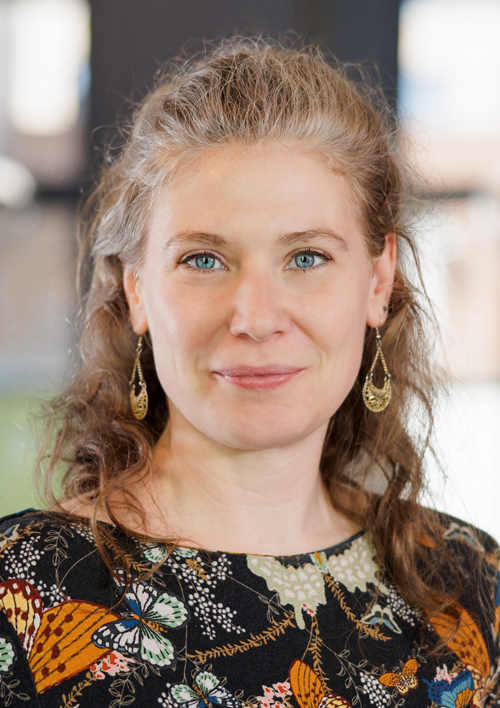Research mental health observatory: an interview with Simone Lackner
Simone Lackner was an invited speaker at the EU-LIFE Community Meeting 2023 and participated in the EU-LIFE 10th Anniversary Conference ‘Envisioning the research centres of the future’ with the poster Shining Light on Mental Health and Well-being in Academia In this interview, Simone presents the STAIRCASE survey on Sustainable Working Conditions in Academia and calls for the scientific community to actively participate.
Simone is a multidisciplinary scientist with a degree in Molecular Biology, a Ph.D. in Systems Neuroscience, postdoctoral training in Complexity and Computational Social Science. She has worked in eleven different institutes in Austria, Singapore, USA, Japan and Portugal. She has vast experience in Science Communication and Public Outreach and as a ReMO Ambassador and the Founder of Soapbox Science Lisbon, the We and Climate Circle and Salon Luminosa, Simone is an Advocate for Diversity, Equity, Inclusion and Well-being in Academia and beyond. With one of her most recent projects, The Empathic Scientist, she creates awareness and discourse to develop collectively interventions that improve well-being in academic research culture with impact on organisational policies.

You are a multidisciplinary scientist, as well as founder of several initiatives supporting well-being and public outreach. Could you tell us a bit about your work? How do the scientific and the advocacy passions come together?
Advocacy and science are not mutually exclusive, follow very similar principles and are historically tied-together, especially in the Humanities (i.e. regarding racism, feminism, etc.) but also in the Life Sciences and Technology (i.e. science policy regarding atomic bomb, biological engineering, artificial intelligence, etc.). I am moved by creative and critical thinking and passionate about evidence-informed decision making. I strongly believe that as a scientist I have the great opportunity and responsibility to help improve the human condition, by not only sharing my skills and expertise with the public, but also with the wider research community, when it comes to academic-related socio-political issues. In order to advocate for systemic change, one needs to identify the issue, do the research to get the facts right, listen to people who benefit and/or suffer under the status-quo, engage with the wider community, promote awareness, public discourse and education, build trustworthy relationships and most importantly practice and embrace resilience. All skills and tools a scientist naturally cultivates by building a career in science.
After more than 15 years of working in different science disciplines, in eleven different institutes, across five different countries, as a female scientist and first generation academic, I am strongly aware of the struggles and challenges one faces to progress in a scientific career.
I observed and experienced how our academic research culture impacts not only the wellbeing of individual researchers but also the dynamics within research teams and the success of a research institute retaining and sustaining excellence in science.
Founding Soapbox Science Lisbon - part of a global science communication and outreach initiative, dedicated to eliminating gender inequality in science - was my first attempt to advocate not only for science but also for equity and well-being in academia and beyond. Simultaneously, I started to study the available research on the subject of wellbeing and mental health in academia, confirming that there are recognized crucial issues in the academic system that need targeted action urgently. I started to share my research and ideas - of how to improve the academic ecosystem in terms of wellbeing - with my peers and diverse stakeholders and realised that I am not alone with the great desire for systemic change. But change takes time, courage and allies. My dear post-doctoral mentor recommended me to have a look at the COST Action programme to find a European-wide network of like-minded researchers to collaborate and work on those urgent issues. That is how I came across the ReMO Ambassador Program.
I strongly believe that by focusing on fostering diversity and equity to raise individual wellbeing our academic system will become more inclusive and successful to sustain excellence in research for society.
What are the objectives of ReMO, the Research Mental Health Observatory funded by the COST Association?
Mental health issues present a significant challenge in the EU. A review across different occupational groups suggests that academics together with teachers are among the groups with the highest levels of common mental health issues, with an estimated prevalence of 37% compared to 19% in the general population. Evidence is increasing that academia is facing a mental health crisis. Some institutes have started to respond with activities addressing researchers' well-being, but there is limited evidence on what constitutes effective practice to address those challenges in academia and capacities are limited to share best practices across the European research community. There is evidence from other sectors regarding mental health in the workplace, however best practice needs to be understood in the context of the unique work environment in which researchers are operating.
The ReMO COST Action is a Horizon 2020 European-funded programme, that brings together an international European community of early-career researchers, faculty, academic human resource managers, coaches, trainers and practitioners for higher education, as well as science policy stakeholders.
ReMO is a growing network of over 240 members that collaborate across different scientific disciplines to identify which practices and actions are effective at creating research environments that foster well-being to prevent the development of mental health issues at the workplace.
With our Manifesto we call on all stakeholders in the research ecosystem to develop policies to monitor, improve and maintain well-being and mental health in research environments.
ReMO has recently launched a STAIRCASE survey on Sustainable Working Conditions in Academia. Why is it important to get as much feedback as possible?
The emerging evidence on mental health of academics makes it more and more difficult to deny that we are facing a full-fledged mental health crisis in academia, particularly for more precarious/junior job levels. What’s more, even when overt mental health issues are absent, this does not mean that researchers are thriving and/or reaching their full potential. However, it is difficult to evidence the specific policies and practices that are having the greatest impact on mental health because this requires data that allow for cross-institutional comparisons, in which inter-organizational differences in policies and practices are related to the mental health of the individual members residing within those organisations.
The STAIRCASE survey [1] specifically aims to investigate how such inter-organizational differences in policies and practices relate to individual mental health.
Specifically, we want to assess both positive indicators such as work engagement and job satisfaction, as well as negative indicators, such as work addiction, depression and burnout.
Next to these indicators, we survey contextual antecedents of mental health, to answer the question of how variance in the departmental, institutional, and country contexts in which researchers reside relates to the mental health indicators.
We are collecting data from individual researchers on work context (e.g., organisational, climate, harassment, job demands & resources), mental health outcomes (depression, anxiety, burnout, work engagement), demographic characteristics, and employment situation, and (insofar as respondents opt in to volunteering such information) social media handles & ORCIDs. The Survey is available in English, French, German, Hebrew, Italian, and Spanish, consists of about 110 questions, and should take respondents approximately 15 minutes to complete. [2]
The survey is very much an initiative for researchers by researchers and seeks to improve the working conditions of academics.
EU-LIFE sits in the European Research Area Forum for Research & Innovation (ERA Forum), where we represent research performing organisations and especially research institutes. Mental health is a transversal topic in the ERA Policy Agenda, in particular on topics such as the reform of research assessment (Action 3), sustainable research careers (Action 4) and gender equality and inclusiveness (Action 5). What do you think stakeholders contributing to the European policy landscape can do to help improve mental health in research? What central recommendation would you put forward?
Academic mental health should not only matter as a public health concern but also for research policy and society as a whole. Some advances have been made, and most institutions have already reacted by offering access to coaches and psychologists to address individual issues of mental health. But that is not enough! This bottom-up approach is treating anxiety and depression induced by research culture as an individual health issue rather than a systemic health issue. It’s time to take a top-down approach and ask the uncomfortable question of how our academic system and culture contribute to these issues.
“When one person has asthma, that person should see a doctor. But when 40% of people have asthma, and 80% of people have breathing problems, something is wrong with the air.”
Barbara W. Sarnecka in The Writing Workshop: Write More, Write Better, Be Happier in Academia
In order to develop successful interventions for wellbeing, mental health and career progression, especially in support of “minorities in academia” (historically marginalised groups, such as women, people of colour, disabled individuals, students from poorer socioeconomic backgrounds, first generation academics and members of the LGBTQ+ community), we need representative data.
Supporting the STAIRCASE Survey is for sure the first courageous big step. However, with all the already available data, we will not be able to ignore any longer the need for organisational interventions to create a research environment that fosters wellbeing while ensuring individual career progression to retain diverse talent and guarantee excellence in science for societal impact.
There are of course many actions one can take on an individual level, but the impact of targeted interventions can be even more powerful, when worked on institutional community level.
Academia urgently needs to take responsibility and invest in:
- institution-wide interventions that systematically monitor and promote well-being and mental health,
- independent and neutral conflict management officers that mediate interpersonal relationship problems, bullying and sexual harassment and last but not least,
- on-site career development officers, who not only support graduates but also faculty and research staff to grow “soft” skills for personal development and self-knowledge, that is essential for healthy team work, cultural-sensitive leadership, and individual career progression in academia and beyond.
The building blocks of a successful research institute are its scientists. In order to nurture well-trained and confident scientists - who can collaborate with respect, tolerance, trust, unity, inclusion and equity, and contribute their unique talents to tackle the world's biggest challenges - the career development of each member, as well as their well-being and mental health, must be cared for. A Call to Action!
[1] The STAIRCASE survey was launched on September 15, 2023, and will remain open for data collection until March 15, 2024.
[2] Watch promotion videos here:
Why should Researchers support the ReMO Survey?
Why should Institutions support the ReMO Survey?



